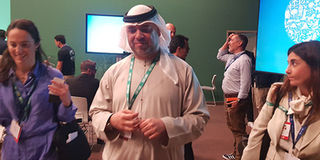Why Dadaab refugee camp topped COP28 food system agenda

Ambassador Majid Al Suwaidi, COP28 Director General at Dubai, United Arab Emirates (UAE) after addressing the media on Agriculture and Water on December 10, 2023, where he underscored UAE's commitment to improve food systems in Africa and other poor countries.
When Ambassador Majid Al Suwaidi, COP28 Director General took a flight to Dadaab Rrefugee Camp after the Africa Climate Summit in Nairobi, he was thrilled by the magical Kenya beauty.
Mr Suwaidi got an opportunity to explore the vibrant Kenya skyline but he was least prepared for what he would expect on the ground.
“I got an opportunity to explore the vibrant and lovely Kenyan skyline but when I landed at Dadaab I was shocked,” said Mr Suwaidi during the conclusion of the action agenda on Food, Agriculture and Water at Dubai COP28.
He added: “I met mothers breastfeeding without eating anything. I saw hungry faces of malnourished children."
“What I saw at Dadaab refugee camp is still fresh in my mind. That mental picture is enough to push my soul to think how a country like UAE can help such vulnerable people.”
“I spent time meeting the people at camp who had fled conflicts and famine fuelled by climate change. The current drought in the Horn of Africa is a worrying situation that has wiped out crops and this is a threat to security in the region.”
“These are symptoms of broken food systems. We’re working to ensure food systems challenges are addressed to feed the world population, those in conflict zones, and improve the quality of lives.”
Balanced diet
About 700 million people globally lack food to eat and a further 3 billion cannot afford to eat a balanced nutritious diet.
The 32-year-old Dadaab refugee camp that is often described as a “sanctuary without end” is home to more than 300,000 refugees who fled civil war in neighbouring Somalia.
As COP28 presidency, we want to make sure that we protect everybody from indigenous people, women and youth, and the vulnerable,” said Mr Suwaidi.
The food system agenda by the UAE, according to Mr Suwaidi, is in line with the objective of the historical UN declaration on Agriculture and food systems in climate action.
This action was endorsed by 134 world leaders representing more than 480 million farmers who produce 75 percent of the world's food despite harsh climatic conditions.
Mariam bint Mohammed Almheiri, UAE Minister of Climate Change and Environment and COP28 Food Systems Lead, said: “Addressing both global emissions and protecting the lives and livelihoods of farmers living on the frontline of climate change are core elements of the COP28 Food Systems Agenda.”
Paris Climate Agreement
“I believe COP28 is a turning point for food systems and agriculture. There is no path to achieving the goals of the Paris Climate Agreement and keeping 1.5C within reach, that does not urgently address the interactions between food systems, agriculture, and climate,” said the Minister.
“Countries must put food systems and agriculture at the heart of their climate ambitions, addressing both global emissions and protecting the lives and livelihoods of farmers living on the front line of climate change,” she added.
A range of initiatives supporting food and climate action were announced during the first thematic session of the World Climate Action Summit.
More than $2.5 billion has been mobilised by the global community to support the food-climate agenda.
The UAE and the Bill and Melinda Gates Foundation launched a $200 million partnership for Food Systems, Agriculture Innovation, and Climate Action, focused on agricultural research, scaling agricultural innovations, and funding technical assistance for implementing the Declaration.
“We want to unlock financial hurdles, get the political goodwill and we are looking at tools we need to implement and that is why we have activated something we are calling an ambition loop. We have been listening to many stakeholders including indigenous people, farmers’ local communities, local governments, and national governments, and connecting the dots,” said Ms Mohammed.
“This is an initiative we spearhead with the US. It was launched at COP26 in Glasgow. We have more than $17 billion committed for investment for climate resilience agriculture projects.”





